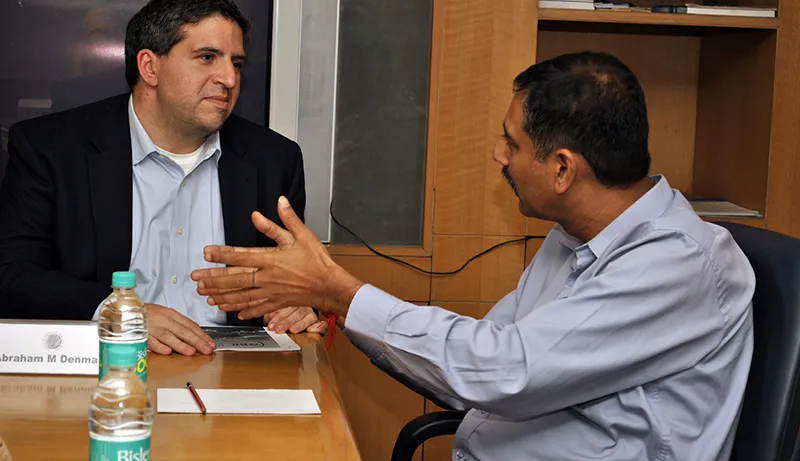-
CENTRES
Progammes & Centres
Location
There are strong indicators of a regionally dominant People's Liberation Army of China attempting for an expeditionary status, says Mr. Abraham M. Denmark, Vice President of the National Bureau of Asian Research.

China’s People’s Liberation Army (PLA) has shown a significant transformation since the 1980’s, mainly driven by its economic development and the changes in international environment (Taiwan contingencies). And, there are strong indicators of a regionally dominant PLA attempting for an expeditionary status, according to Mr. Abraham M. Denmark, Vice President (Political and Security Affairs) of the National Bureau of Asian Research.
Initiating a discussion on "Emerging Expeditionary Capabilities of the People’s Liberation Army" at Observer Research Foundation on September 18, Dr Denmark pointed out that the PLA has acquired new capabilities, including surface, subsurface, air and missiles (A2AD). There are smaller mechanised and informatised units designed for conflicts beyond China’s coasts.
He said PLA views the United States as the primary contender and intends to deter, delay and degrade, at least, the US military presence in the West Pacific. Dr Denmark said the "new missions" of the PLA are mainly in the light of its "new interests". China, with its economic interests tied to global markets and heavy dependence on the Middle East for energy requirements, has now recognised its military as an effective tool of soft power. In fact, he noted, the PLA has been active in protecting Chinese people and investments overseas: the most significant example of this being the PLA rescue of Chinese citizens in Libya in 2011.
These "new interests" of China have led to new military missions of the People’s Liberation Army, namely HA/DR, PKO, counter piracy missions (mainly in the African coast) and the Non-Combatant Evacuation Operations (NEO). The successful PLA missions in Libya, Africa et al show enhanced capabilities in international peaceful environment. Mr. Denmark posited that the expeditionary focus of the People’s Liberation Army is a significant break-away from the traditional model.
The main objectives of the expeditionary focus of the People’s Liberation Army are to: contribute to public goods; and protect overseas interests and people. These objectives clamor for several reforms from the traditional model. The expected reforms include revision of the local war doctrine, improvement of joint operation capabilities and reorganization of the military region system. In addition, the PLA force structure will shift significantly. In order to operate away from the mainland, their C4ISR (Command, Control, Communications, Computers, Intelligence, Surveillance and Reconnaissance) will be enhanced and expanded considerably and overseas bases will be established. It is expected that the PLA will train extensively for mobility and power projection. Mr. Denmark further added that an expeditionary PLA necessitates a substantial increase in numbers and refurbishing of their strategic lift, landing platform dock ships, amphibious ships, aircraft carrier battle groups and expeditionary air power (aerial refueling).
Mr. Denmark concluded his presentation on the note that while there are other implications for the emerging expeditionary capabilities of the PLA, the People’s Republic of China is likely to continue its non-intervention policy. He postulated that the key variable in the given context is behavior, and not capability. The point to ponder is how this significant change of approach of the People’s Liberation Army will manifest in China’s global image. Naturally the first question that arises is whether China will be a revisionist power or not.
Mr. Denmark observed that while China will be hoping to avoid leadership from outside with an expeditionary PLA, it is unlikely to seek conflict. He speculated that it may make use of the small changes to gradually alter the global order. Furthermore, its implications may extend to a change in the global balance of power. Especially in the context of America withdrawing gradually from the Middle East, chances are China, with its expeditionary capabilities, may attempt to supplant the American power in the Middle East. The presentation was followed by an engaging discussion/interaction of the participants with the speaker.
The interaction was chaired by Dr Rajeswari Pillai Rajagopalan. In her opening remarks, she spoke about the relevance of the topic in the context of President Xi’s visit to India and the current India-China relations.
(This report is prepared by Kaveri Ashok, Research Intern, Observer Research Foundation, Delhi)
The views expressed above belong to the author(s). ORF research and analyses now available on Telegram! Click here to access our curated content — blogs, longforms and interviews.